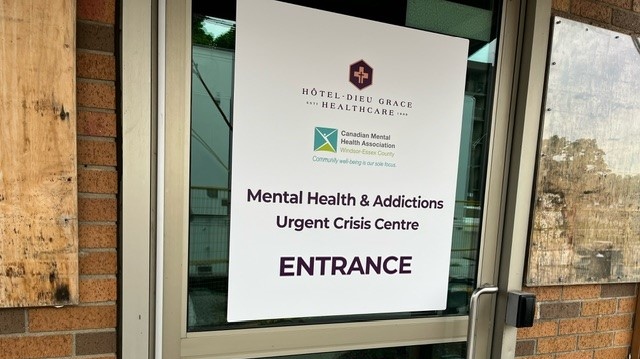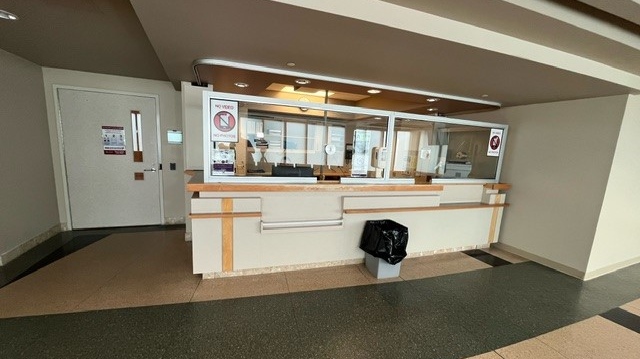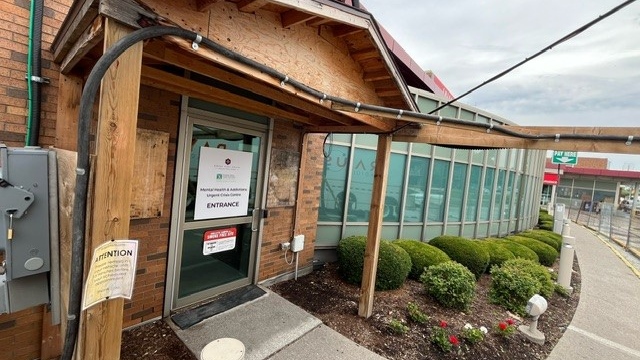Hôtel-Dieu Grace Healthcare (HDGH) has relocated its Mental Health and Addiction Urgent Crisis Center (MHAUCC), along with several other programs it previously operated at 744 Ouellette Ave., to two separate locations that remain on Ouellette Avenue.
The new crisis centre is located on Windsor Regional Hospital's Ouellette campus, near the emergency department on Goyo Street. Other programs are currently offered on floors one through three of HDGH's new downtown campus in the former Sutherland Global building, 500 Ouellette Avenue.
“This is not about geography. This is not about location-based services. This is about being in the right place at the right time,” said Bill Mara, president and CEO of Hotel Dieu Grace Healthcare.
“When it comes to service delivery, we have to be really client and patient-centric, not just provider-centric, and this is ideal,” Mara said.
The move is also thanks to an evolving partnership between HDGH, the Windsor-Essex County Chapter of the Canadian Mental Health Association and Windsor Regional Hospital.
 Mental Health and Addiction Urgent Crisis Centre (MHAUCC) at 1030 Ouellette Ave. on June 26, 2024. (Chris Campbell/CTV News Windsor)
Mental Health and Addiction Urgent Crisis Centre (MHAUCC) at 1030 Ouellette Ave. on June 26, 2024. (Chris Campbell/CTV News Windsor)
The MHAUCC opened during the COVID-19 pandemic and is intended for individuals aged 16 and older who are experiencing a mental health or addiction crisis and cannot safely wait for local mental health and addiction supports.
The relocated emergency center opened on Monday, and officials said they were expecting an increase in the number of patients, noting that about eight people a day were coming for help at the previous location.
“This is a really viable option for anyone over 16 who is experiencing any kind of mental illness, addiction crisis or panic attack,” Mara explained. “If you have a history of anxiety disorders or you want your medication reviewed, if you don't have primary care or don't have a GP, come here.”
“We will continue to monitor the program to ensure our opening hours are appropriate. If changes are needed, we will adjust accordingly. If the growth trajectory is as expected, our goal is to expand our opening hours in the future,” he said.
Services available at MHAUCC include crisis walk-in services (available daily from 8am to 8pm), links to primary care at CMHA health centres and a 24/7 telephone crisis hotline.
 Mental Health and Addiction Urgent Crisis Centre (MHAUCC) at 1030 Ouellette Ave. on June 26, 2024. (Chris Campbell/CTV News Windsor)
Mental Health and Addiction Urgent Crisis Centre (MHAUCC) at 1030 Ouellette Ave. on June 26, 2024. (Chris Campbell/CTV News Windsor)
Mara said the move is in keeping with the city's recently approved Downtown Core Enhancement Plan.
“It's a very comfortable, convenient and non-judgmental environment for someone in crisis to come and talk to,” Mara said.
“The reason we're moving here is to better coordinate between us and the emergency department and make sure we have patients in one place in any situation to make sure they're in the right place,” said Kevin Matte, who oversees crisis services and is integrated operations manager for Hôtel-Dieu Grace and the Canadian Mental Health Association.
“We do crisis intervention, so anybody that comes in with mental health concerns, psychosocial crisis, depression, mood disorders, any of those types of issues, they come here, they check in, they have the opportunity to meet with a crisis responder,” Matt said, “We do a safety assessment, we do a brief intervention, we connect them to community resources, or we can quickly direct them to an emergency department if they need emergency room level care.”
He continued, “Now that I'm here, it's a lot easier.”
“We want people to come to the right place. We want people to get services in a timely manner when they are in a mental crisis. So if people know we are here, I think more people will get care. The main benefit of being here is that clients always get to the right place and we can help them get there,” he said.
HDGH officials said 500 Ouellette Ave. will offer group rooms and “private office space for one-on-one support.”
The following services will be provided there:
Injection Clinic, General Psychiatry Clinic, Transitional Youth Clinic, Assessment and Referral, Wellness Programs, Community Withdrawal Management, CMHA – Coordinated Access, Assertive Community Treatment (date TBA).
“We all recognize that we need to do more, be innovative and know when and where people are to receive services,” said Jonathan Foster, vice-president of emergency and mental health at Windsor Regional Hospital. “It's a little bit difficult to get someone just two blocks down the street, especially if they're not doing well or they're in a crisis. So, having staff here allows for a face-to-face meeting. We can explain services, make introductions and start to gain a little bit of trust in how the transition works.”
“This will benefit downtown and improve coordination between services. It will create a seamless transition for patients and their families as they move between services,” Foster added.



